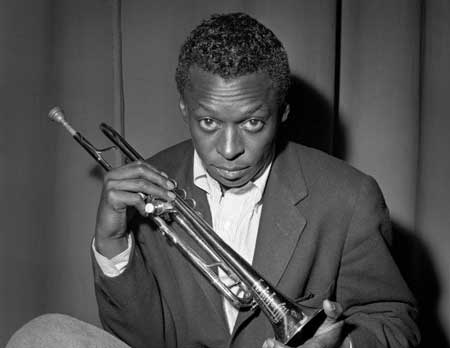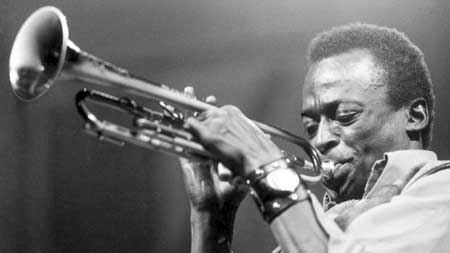Film (2019)
Documentary
Directed by Stanley Nelson
Film Editing by Lewis Erskine, Yusuf Kapadia, Natasha Mottola
Released: August 23, 2019
Reviewed by Alfred Clemente, Ph.D.

Director Stanley Nelson’s film, Miles Davis: Birth of the Cool, at times blazes with intensity. Miles was a genius, his music profound, the film an extended documentation of his artistic brilliance, spiritual purity, and human weakness.
Apart from the occasional voice-over imitating Miles’s signature raspy voice, there is no acting here, no actor pretending to be the incomparable Miles Davis. After all, how can one successfully fake being Miles? Nelson supplies the real evidence: countless clippings — both stills and films – of the shy son anxious to please strict parents; the teenaged musician talented beyond his years; the obsessive searcher of the meaning and mystery of sound; the poet of the mystique of coolness; the complex human being whose angers could sully his artistic sanctity.
Miles was unique. He became a leader of jazz musicians whom he urged not to play what was printed on the page, but rather what they were feeling. Even more than that, working with John Coltrane, or Cannonball Adderley, among others, he often supplied no music at all. “Just play,” he instructed the gifted sidemen whom he had chosen to join him precisely because he had already recognized their magically creative gifts.
Feted for his music, he became famous for his attitudes and demeanor as well — his suspicion of those he saw as wishing to exploit him; his utter impatience with anyone who might attempt to compromise his art; his disinclination to charm audiences other than by his music. Nelson’s film is an encyclopedia of the life and art of this brilliant but besieged musician.
By the late forties, other gifted Jazz musicians, such as Dizzy Gillespie and Charlie Parker, were capturing the spotlight. Miles was particularly smitten by Parker’s unique genius, choosing to play with Bird when he could have earned much more elsewhere. Enamored of the new and challenging in music, Miles idolized Bird’s rococo jazz notations and his breakneck speed. Miles compared Charlie Parker to Salvatore Dali — describing their art as “a new way of looking at things.” Yet Miles’s own mystique was no less a thing of wonder than Bird’s, as is shown, for example, in Miles’s incomparable Kind of Blue, an insistent and haunting quietude that mesmerizes, and that equally challenges description.
Nelson’s film highlights the judgments of many jazz musicians who played with Miles—or who dreamed of playing with the master. The acclaimed bassist, Ron Carter, describes playing nightly in a Miles group: “It was like going to a laboratory, and Miles was the chief chemist.” Discerning Miles’s seriousness, impresario Quincy Jones describes Miles as wanting to be an artist “just like Stravinsky.” Referring to Miles’s seductive tone, the promoter George Wein says, “He put the bell right into his trumpet and changed the whole world of jazz.” One young musician in Nelson’s film admits, “I didn’t just want to play like Miles Davis. I wanted to be Miles Davis.”

And fame and fortune followed. Nelson’s film limns the contours of Miles’ success, his persona becoming as gravitational as his music. Miles became the epitome of cool. His was a “new way of doing everything.” He was the archetypal “coolster.” At clubs where he played, the audiences often included the likes of Ava Gardner, Frank Sinatra, Lena Horne, and Marlon Brando. Women described him as “our black superman.”
At the same time, the film does not evade some of the darker realities of Miles’ relationships with women, touching upon the complexities of his three marriages, their joys and sorrows. The film makes perfectly clear that Miles, attractive to so many women, could be petty and selfish to the women he ostensibly loved. His first wife, Frances Davis, plays an outsized role in the documentary. A talented and acclaimed dancer, she starred in the cast of Leonard Bernstein’s West Side Story, but Miles, witnessing the extent of her popularity, forced her to quit. Her place was at home, he insisted, “in the kitchen.” Inexplicably, Frances relented, essentially destroying a promising career—and, years later, a marriage. The tale of a man of genius corroded within by simple jealousy? By other, profounder shadows? The film leaves us pondering and saddened.
At another point in the film, Miles, whose angers for the most part lay submerged beneath the brilliance of his musical genius, endures an experience which he openly says embittered him forever. Playing at Birdland and stepping outside during a break to smoke a cigarette, Miles is confronted by a club-wielding policeman who tells him to move on. Miles tries to explain that he is a musician whose band is playing inside, at Birdland, and that he is simply taking a smoke break. The cop insists, Miles refuses to move and is viciously struck in the head by the officer’s club, Miles’s face suddenly battered and bloody. The scene is unforgettable, volumes of racial history captured on Miles Davis’s face.
Nonetheless, Miles’s art and celebrity continued to be boundless until new kinds of music began to insinuate themselves in American culture—e.g., rock, punk, as well as non-Western modalities—and Miles, always tantalized by music’s variegated splendors, pursued the new sounds. Even his dress and demeanor became outlandish, reflecting more pop and rock than jazz. The avatar of “cool” was leaving it all behind. When erstwhile fans asked him to play “the old stuff,” Miles’ standard response was to “buy the record.”
Ultimately, most of the magic disappeared. Miles quit playing for about five years. His explanation was that it was mostly for health reasons — and he did have his illnesses — but he was also spiritually exhausted. He stopped playing and became, in effect, a recluse, although he was eventually to return to the music scene, still searching for the mystical sound—this time, more difficult to locate.
Stanley Nelson’s perceptive documentary paints a caring and attentive portrait of an often tormented American master whose musical magic still enchants the world.
Alfred Clemente teaches American literature at Fordham University. He writes academic materials, arts criticism, poetry, and fiction. He has recently completed a novel and has begun work on a study of Emily Dickinson’s poetry.
Leave a Reply